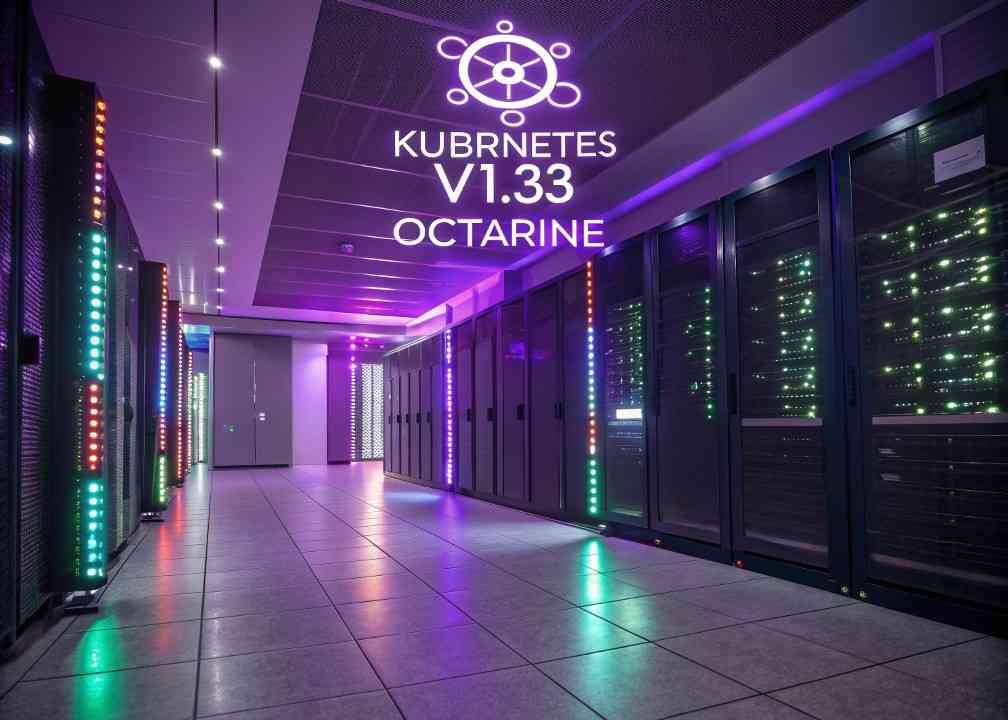Kubernetes v1.33, codenamed “Octarine”, marks a significant milestone in the Kubernetes journey with a strong focus on scalability, security, and developer experience. Released on April 23, 2025, this update ships 64 enhancements: 18 stable, 20 beta, and 24 alpha features.
Let’s unpack the most impactful updates that developers and platform engineers should care about.
Native Sidecar Containers Now Stable!
The sidecar pattern is now officially supported by Kubernetes. This allows companion containers (like proxies or loggers) to run reliably alongside primary containers in the same Pod with native lifecycle management.
What this solves:
- Ensures sidecars start before and shut down after main containers.
- Solves long-standing issues with logging agents, service mesh proxies, etc.
- More consistent initialization and graceful shutdown behavior.
This will simplify architectures built on service meshes like Istio or Linkerd, and improve reliability for logging/monitoring agents.
In Place Pod Resource Resizing Beta
Gone are the days of having to delete and recreate pods just to change CPU/memory limits. With in-place resizing, you can now scale resources of running pods without disruption.
Why this matters:
- Vital for stateful apps, databases, and long-running jobs.
- Reduces downtime and operational friction.
- Enables adaptive vertical scaling in real-time.
Bound Service Account Tokens Now Stable
Security improvements continue with JWT-based bound tokens for service accounts.
Benefits:
- Time-bound and audience-bound tokens.
- Better API authentication practices.
- Aligns Kubernetes with modern security protocols.
ClusterIP Allocation Redesign
Kubernetes has revamped how Service IPs are allocated, leveraging new GA APIs: ServiceCIDR and IPAddress.
Highlights:
- Prevents IP conflicts with unique cluster-wide enforcement.
- Supports dynamic IP pool expansion.
- Helps cluster operators better manage large-scale service IPs.
CSI Migration Expands to More Drivers
The migration from legacy in-tree volume drivers to CSI (Container Storage Interface) is now available for more plugins in stable form.
Why this is important:
- Reduces tight coupling to the Kubernetes core.
- Enables storage vendor flexibility.
- Encourages use of external, updatable storage providers.
IPv4/IPv6 Dual Stack Maturing Further
Dual-stack networking continues to evolve with:
- Better config options
- Performance improvements
- Expanded network policy logging (beta)
This provides better observability and control for multi-IP clusters, particularly in hybrid cloud and telco environments.
Deprecated & Removed Features
- Endpoints API ➝ replaced by EndpointSlices for scalability.
- gitRepo volume type ➝ removed due to security concerns.
- Windows Host Networking ➝ deprecated due to unresolved technical constraints.
Example: Native Sidecar Container Deployment
yaml
apiVersion: apps/v1
kind: Deployment
metadata:
name: myapp
spec:
template:
spec:
volumes:
- name: data
emptyDir: {}
initContainers:
- name: logshipper
image: alpine
command: ['sh', '-c', 'tail -F /opt/logs.txt']
volumeMounts:
- name: data
mountPath: /opt
containers:
- name: myapp
image: alpine
command: ['sh', '-c', 'while true; do echo "logging" >> /opt/logs.txt; sleep 1; done']
volumeMounts:
- name: data
mountPath: /opt
This shows how Kubernetes ensures sidecar containers are properly ordered and share volume state.
Final Thoughts
Kubernetes v1.33 “Octarine” is not just about new features it’s about refinement and operational maturity. From solving long-standing pain points like pod resource resizing and sidecar lifecycle issues to strengthening API security and network policy visibility, this release demonstrates the project’s responsiveness to real-world developer and SRE needs.
Whether you’re scaling microservices, managing stateful workloads, or running AI/ML pipelines, Kubernetes v1.33 brings meaningful quality-of-life improvements.
Explore more:
Official blog: kubernetes.io/blog/2025/04/23/kubernetes-v1-33-release

